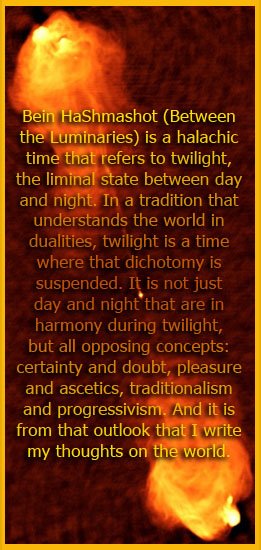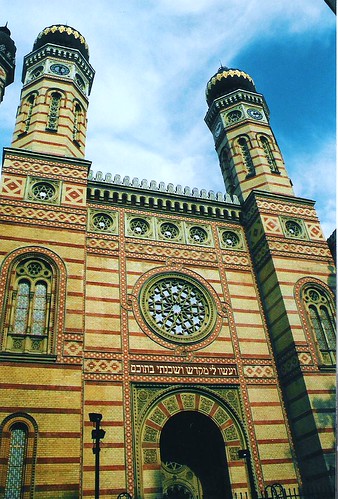 I haven't been writing so much in this blog because I'm starting to see personal blogging as narcissistic and masturbatory. Who really cares what my opinion is on Israeli politics or the state of Judaism? Lately I found good use for this blog: it worked somewhat as a travel blog to record my experiences, though I had rare occasions with the internet, and it's also a good place to post my philosophical cartoons (more to come!). But I figure, I can also use this space to ramble about my thoughts and dreams so that I can have it written out and refer to it later. If someone finds it and is interested, great for them, but as of now it is mostly for me.
I haven't been writing so much in this blog because I'm starting to see personal blogging as narcissistic and masturbatory. Who really cares what my opinion is on Israeli politics or the state of Judaism? Lately I found good use for this blog: it worked somewhat as a travel blog to record my experiences, though I had rare occasions with the internet, and it's also a good place to post my philosophical cartoons (more to come!). But I figure, I can also use this space to ramble about my thoughts and dreams so that I can have it written out and refer to it later. If someone finds it and is interested, great for them, but as of now it is mostly for me.That being said, whoever is reading this is about to partake on a journey into my utopian vision of Judaism, a new sect which I am creating known as Post-Modern Orthodoxy!
In its most basic pshat, its just a silly play on words which means that all laws are subjective depending on who is reading into them, just as post-modern art is based in the personal interpretation of the viewer rather than the message that the artist is trying to convey.
But on a deeper level, I have many issues with the hierarchical and sectarian nature of modern Judaism which I have been trying to grapple with. I used to call myself Orthodox because of the standards that I tried to uphold, but once I started reading too many existentialist thinkers, I had problems seeing everything as objectively as an Orthodox Jew is meant to. During my encounters with progressive pluralist synagogues that challenged the standard norms of where and how each sect is supposed to pray such as Shira Hadasha, the Mission Minyan, and the Open Orthodoxy Movement, I started to think about what "Orthodoxy" meant. I decided that there are many assumptions and associations that people make about Orthodox people that I did not fit into, and I didn't like how people were categorized based on their system of belief. These progressive minyanim challenge the boundaries between sects and break down the differences between them. Why does it matter to conform to the ideology of a specific group-thinking that is mostly outdated anyways? No Conservative Jew actually believes in the power of the Rabbinic Assembly to contemporize Halachah, they do it themselves, and no Reform Jew studies enough text to actually be able to actually decide what is relevant and what is not. Even Orthodox Jews are no long reacting to liberal Judaism (at least those who are self-confident about their lifestyle or who aren't campaigning against the "Holocaust of Intermarriage").
More important than segmented affiliationism, in this day and age, is finding a spirituality that is right for you. Rather than looking to the past to figure out where one nicely fits into the puzzle, one must look to their peers in the present and decide how their community should work for them. If there are women who want to be counted in the minyan, the community should figure out how to include them. And if there are men who feel uncomfortable hearing women sing, they should also be accounted for. There are no unsurmountable Halachic standards in Post-Modern Orthodoxy, because people should not be forced to conform to a system they don't believe in. On the other hand, PMO does not throw out tradition like other denominations do. Rather than working with nothing and adding on what they feel comfortable with, as Reform Jews do, PMO Jews begin with everything and work as a community to decide what and how they should alter. That is the "Orthodox" part of PMO. This involves a lot of study with the help of every member of the community, in the same way that an Orthodox community spends a lot of time in the Beit Midrash, thus making intensive study an important part of Jewish life as it has for thousands of years. Ideally, this will result in a range of religious practice that includes an egalitarian halachic community such as Shira Hadasha as well as a more liberal pluralistic community that caters to its halachic members such as the Mission Minyan. These communities will be pluralistic, all-inclusive, and non-judgemental.
Sure, they will involve a lot of internal debate, but isn't that what Judaism is all about?


 RSS Feed (xml)
RSS Feed (xml)

